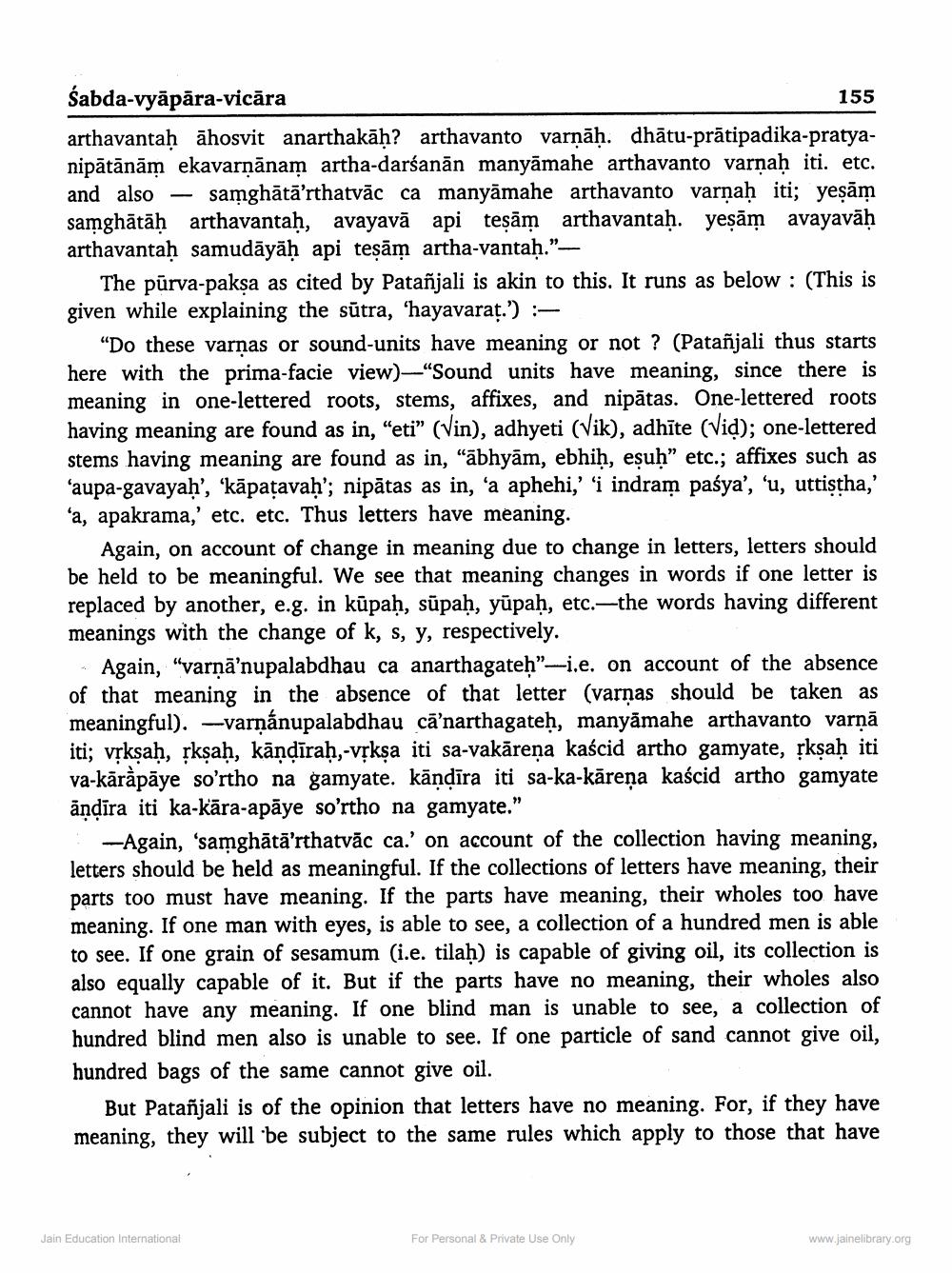________________
Sabda-vyāpāra-vicăra
155
arthavantah āhosvit anarthakāh? arthavanto varnāh. dhātu-prātipadika-pratyanipātānām ekavarnānam artha-darśanān manyāmahe arthavanto varnah iti. etc. and also – samghātā'rthatvāc ca manyāmahe arthavanto varnaḥ iti; yeşām samghātāḥ arthavantah, avayavā api teşām arthavantah. yeşām avayavāḥ arthavantaḥ samudāyāḥ api teşām artha-vantah.”
The pūrva-paksa as cited by Patañjali is akin to this. It runs as below : (This is given while explaining the sūtra, “hayavarat.') :
“Do these varņas or sound-units have meaning or not? (Patañjali thus starts here with the prima-facie view)—"Sound units have meaning, since there is meaning in one-lettered roots, stems, affixes, and nipātas. One-lettered roots having meaning are found as in, “eti” (Vin), adhyeti (Vik), adhīte (Vią); one-lettered stems having meaning are found as in, "ābhyām, ebhiḥ, eșuh” etc.; affixes such as 'aupa-gavayah', 'kāpatavah'; nipātas as in, 'a aphehi,' 'i indram paśya', 'u, uttistha,' 'a, apakrama,' etc. etc. Thus letters have meaning.
Again, on account of change in meaning due to change in letters, letters should be held to be meaningful. We see that meaning changes in words if one letter is replaced by another, e.g. in kūpaḥ, sūpah, yüpah, etc.—the words having different meanings with the change of k, s, y, respectively.
Again, "varņā'nupalabdhau ca anarthagateh”-i.e, on account of the absence of that meaning in the absence of that letter (varnas should be taken as meaningful). ---varnánupalabdhau câ'narthagateh, manyāmahe arthavanto varnā iti; vrksah, rkşah, kandīrah,-vřksa iti sa-vakārena kaścid artho gamyate, șkşah iti va-kārăpāye so'rtho na gamyate. kāndīra iti sa-ka-karena kaścid artho gamyate ändira iti ka-kāra-apāye so’rtho na gamyate."
-Again, 'samghātā'rthatvāc ca.' on account of the collection having meaning, letters should be held as meaningful. If the collections of letters have meaning, their parts too must have meaning. If the parts have meaning, their wholes too have meaning. If one man with eyes, is able to see, a collection of a hundred men is able to see. If one grain of sesamum (i.e. tilah) is capable of giving oil, its collection is
ly capable of it. But if the parts have no meaning, their wholes also cannot have any meaning. If one blind man is unable to see, a collection of hundred blind men also is unable to see. If one particle of sand cannot give oil, hundred bags of the same cannot give oil.
But Patañjali is of the opinion that letters have no meaning. For, if they have meaning, they will be subject to the same rules which apply to those that have
Jain Education International
For Personal & Private Use Only
www.jainelibrary.org




